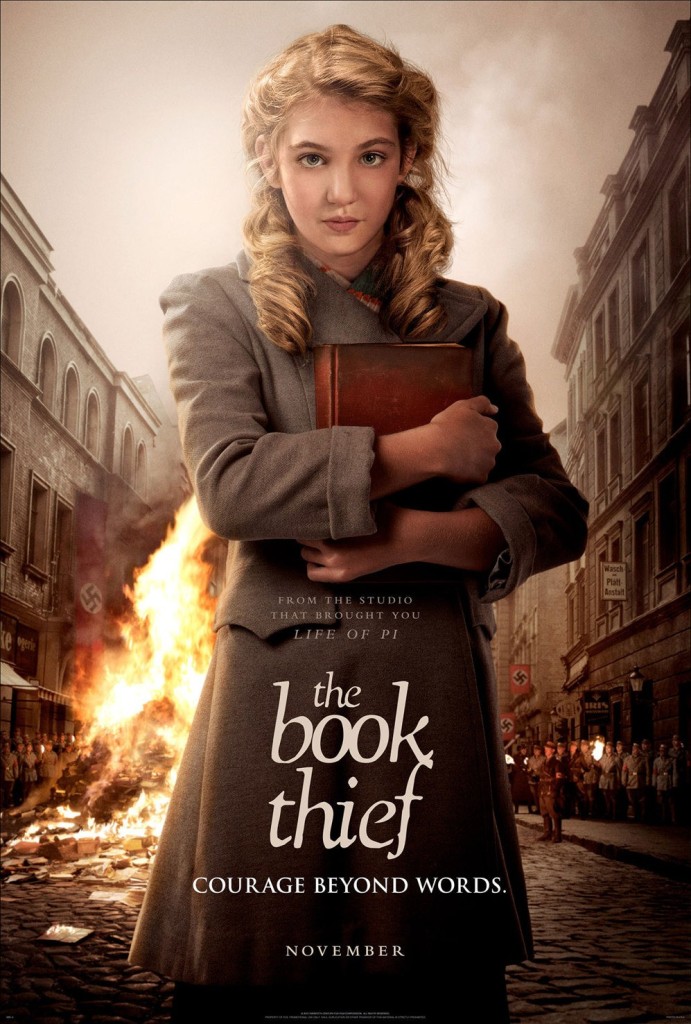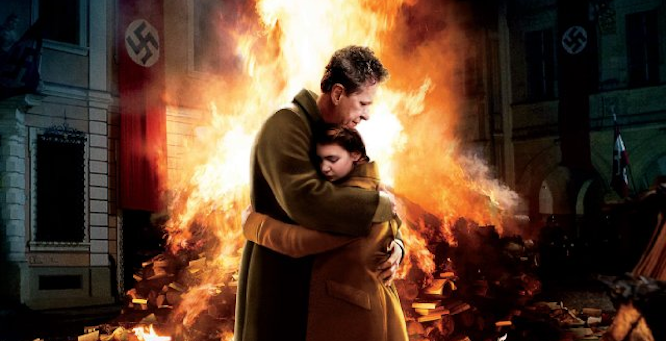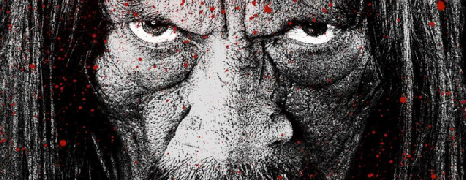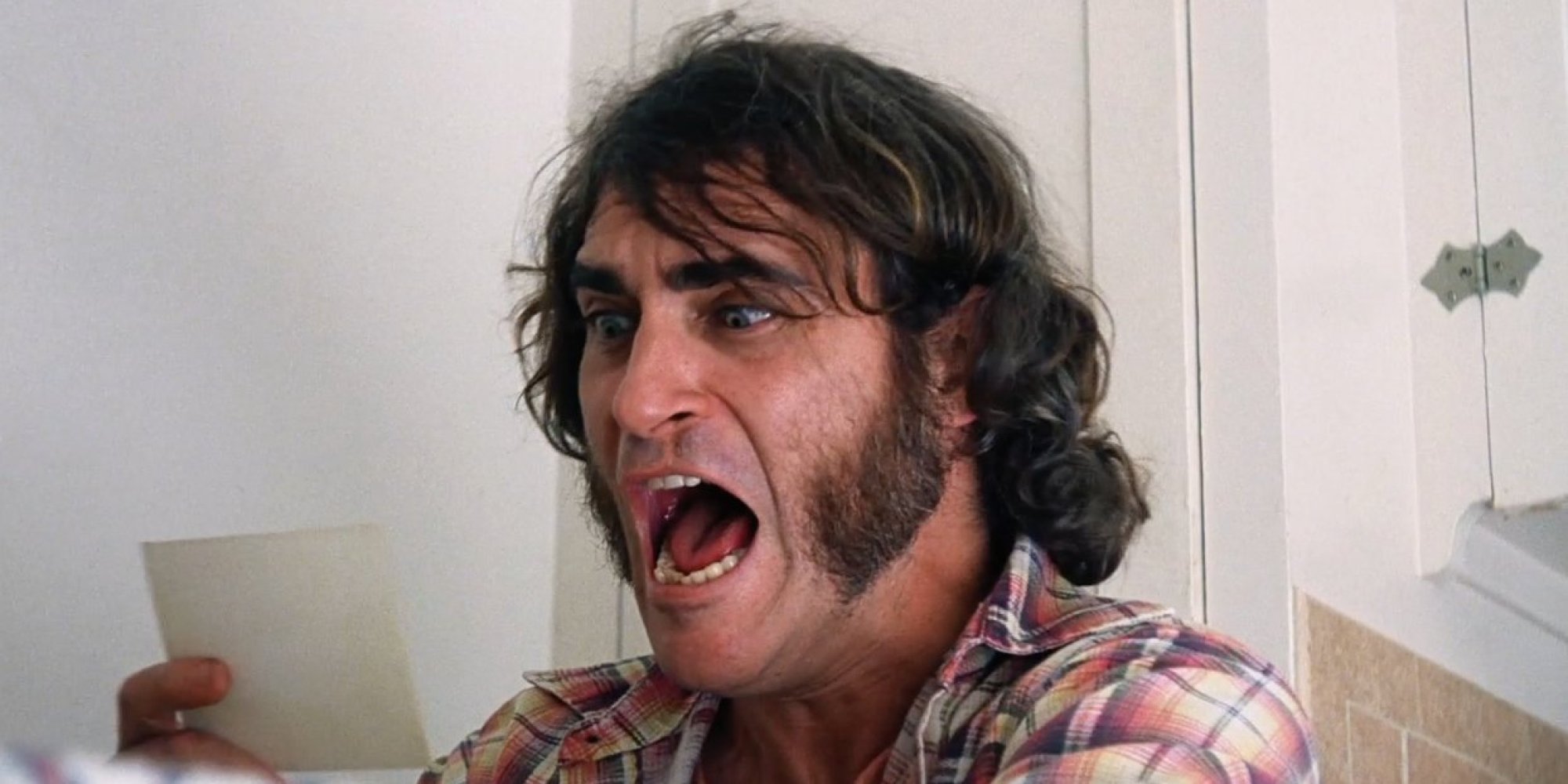A snow-speckled landscape outlines a beautiful cobble stone street. Children rush to school in their winter uniforms as their parents open storefronts and fritter away the day with chores and errands. It’s a setting saved for post cards and snow globes. I know what you’re thinking…Nazi Germany right? Well that’s exactly the scene in the new film The Book Thief – based on the best selling novel of the same name. It’s a setting and tone that’s fraught with possibility, dread and inevitability. So why does it ring so hollow?
Liesel (Sophie Nelisse) is a young foster-child. In the fall of 1938 she is sent to live with a couple in the small, fictional town of Molching – just outside of Munich, Germany. Her new parents are old hats in the community. Her mother Rosa (Emily Watson) is a hardened woman, forced to clean and iron clothes for the wealthier population just to make ends meat. Her husband Hans (Geoffrey Rush) is the town painter. He’s a kind, playful soul who seldom works in his elder years – seemingly because in a town this small once you’ve painted everything the only thing left to do is wait to paint it again.
 Liesel is a quiet girl. She spends her early days going to and from school speaking barely a word. A neighbor boy called Rudy (Nico Liersch) offers to walk her to school. He’s a popular boy who has a keen eye on the new girl in town. Slowly they become friends as Rudy’s persistence wears down Liesel’s defenses.
Liesel is a quiet girl. She spends her early days going to and from school speaking barely a word. A neighbor boy called Rudy (Nico Liersch) offers to walk her to school. He’s a popular boy who has a keen eye on the new girl in town. Slowly they become friends as Rudy’s persistence wears down Liesel’s defenses.
For the better part of the first hour of the film there is little to mark the setting (apart from the period clothing.) It’s not until Liesel joins her school choir in singing the Third Reich National Anthem that the dread begins to creep in. Slowly Nazi Germany descends upon this picturesque small town. Banners and flags dot the roads, book-burning ceremonies commence in the town square and resident Jews are beaten and extradited by roving soldiers.
As the Nazi stranglehold forms, so does Liesel into a fully realized young adult. When she arrived to her new family she couldn’t read but had a passion for books. Slowly, Hans (not the best reader himself) helps her realize that passion. In a stroke of luck, as Liesel is delivering laundry to the town Bürgermeister she forges a bond with his wife Ilsa. Ilsa has lost a child and finds peace in her library with Liesel, reading in what must be the only refuge for literature in the town.
But a wrench is thrown into Liesel’s life when a runaway Jew named Max shows up on her parent’s doorstep. Hans and Rosa never think twice about bringing Max into their home and nursing him back to health. He rests in Liesel’s room as he recovers and each day she brings a book from Ilsa’s library to read him. Soon he must be moved to the basement as not to arouse suspicion or be seen. Liesel rushes home each day from school as her bond with Max grows. Books from The Invisible Man to Mein Kampf are topics of discussion. Max even encourages Liesel to begin to write her own stories.
The tone that Director Brian Percival strikes is a respectful one. Frankly it’s too respectful of the period. By creating an almost Disney-level veil of safety around this town I never felt the dread or iron fist of the Nazi regime as fully as I should have. Everything is just a little too clean. There are lines of dialogue that mention the situation – the lack of food and distinct lack of work but nothing ever feels tangible. The film strives mightily to avoid schmaltzy Hollywood clichés but gives in a bit too often. Percival also employs a bizarre narrative device by using an omniscient narrator who happens to be – death. This is interesting in theory (and I’m sure is something that works in the novel) but here it adds to the fairy tale artifice.
Although the tonal shifts can be dramatic the actors reign in their performances. Geoffrey Rush is Oscar-worthy as the tender Hans. His face is so expressive that I actually wished the film had been about his struggle to survive in such a time. Emily Watson as his wife Rosa is as dependable as ever, giving the film a giant heart and some of the best laughs. She also gets the best tearjerker scene that is delivered wonderfully. Sophie Nelisse also does an admirable job in a role that requires too much of the young actor. Liesel is a vulnerable character that slowly comes-of-age and Nelisse gives the wide-eyed little girl just enough wonder to be convincing. Her emotional scenes don’t resonate as much but overall she’s a fine new actor. Her counterpart Ben Schnetzer as Max is a little too fresh-faced (adding to the films overall lack of authenticity) but is very approachable and warm in his performance.
The Book Thief is a beautiful-looking, harmless film…which is exactly the problem. I fear by neutering something as horrifying as 1940’s Germany it actually has the opposite effect that’s intended. The film does a good job humanizing a section of the WWII population that is seldom read or seen while at the same time creating a fairy tale that’s as hollow as it is shallow.





